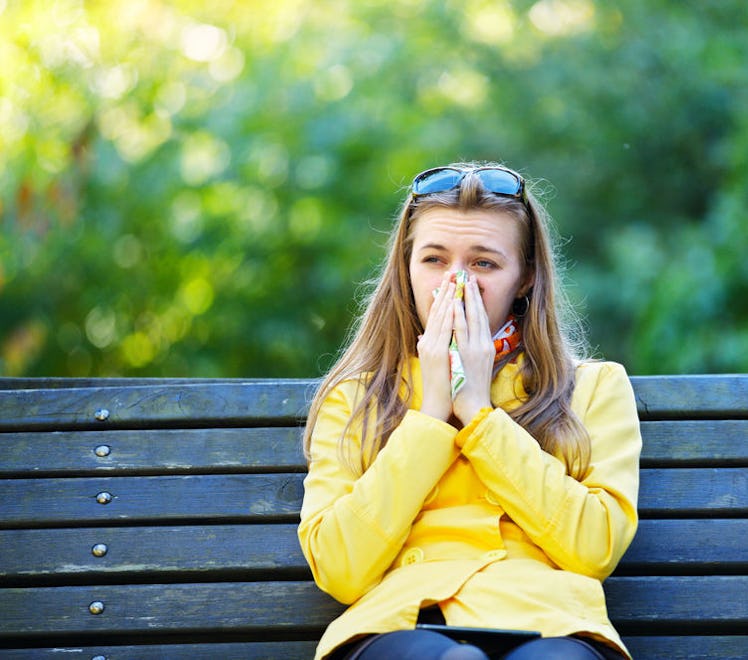
Yes, This Allergy Season Really Is Worse Than Usual, & Here's Why It's Gotten So Bad
Spring is well underway, folks, but even though summertime is literally weeks within reach, it gives me great displeasure to report that allergy season is far from over for us. I mean, maybe you’re superhuman and somehow immune to the wild effects pollen has on the human nose, ears, and throat, and if that’s the case, I hate you. No, but seriously, if your allergies are making you especially irritable lately, and you’re wondering why this allergy season is so bad, wallowing in self-pity while you contemplate if the trauma is ever going to end, shake your snot-filled Kleenex at climate change, friends.
First things first, what even is this cruel and unusual punishment we call allergies? Well, according to Dr. Neeta Ogden, an adult and pediatric allergist, asthma specialist, and an immunologist privately practicing in New Jersey, it's nothing good. An allergy, Dr. Ogden tells Elite Daily, can be defined as "a common, chronic disease" that develops when your immune system meets foreign substances it doesn’t agree with. Basically, if you’re allergic to something like pollen or dust mites, coming in contact with these things can cause a chemical reaction in your immune system, flaring up all kind of annoying symptoms such as "sneezing fits, a runny nose, nasal congestion, and itchy eyes, nose, and throat." Sounds just peachy, doesn't it?
Allergies are particularly heinous right now, and it's all because climate change is apparently making pollen even more of a problem for your immune system this season.
To put it plainly, pollen’s a b*tch, but it doesn’t work alone. ABC News reports that, per board-certified allergist and immunologist, Dr. Jeffrey Demain’s statements at the March meeting of the American Academy of Allergy Asthma and Immunology (AAAAI), allergies are triggered as a result of a combination of factors, such as “higher temperatures and increasing levels of carbon dioxide.” Humidity, plus a ton of carbon dioxide in the air, he explained, leads to a spike in allergy-triggering proteins in pollen. The higher the pollen count, the higher the probability you'll feel the effects — and boy are we feeling 'em this year.
So here’s where climate change factors into all of this: According to the AAAAI, climate change is associated with rising temperatures, changes in weather pattern (days-long rainstorms, anyone?), and “increasing airborne pollen levels.” All of these factors ramp up the pollen count, disperse these sneeze-inducing particles in the air, and lead to a full-blown attack on your immune system.
According to statistics from the American College of Allergy, Asthma, and Immunology (ACAAI), a whopping 50 million plus Americans are dealing with allergies every year, so it’s likely that most of you know what to expect at the tail-end of winter, when March rolls around, the sun comes up, and flowers start to bloom. However, allergist Tania Elliott, M.D., recently told Refinery29 that, even if you don’t have allergies, there’s a solid chance your immune system might end up responding to the massive amount of pollen in the air with allergy-type symptoms. “Because the pollen is so abundant,” she explained, “anyone who inhales a lot of it might suffer.” So basically, none of us are safe? OK cool.
Allergens might be on a mission to make your life miserable this season, but there are plenty of ways to ward off symptoms before that can happen.
Trust me, friends: I know from experience just how incredibly awful allergies can be, but because I’ve dealt with the symptoms for years, I know a thing or two about how to tame them. Generally speaking, I’m not a huge fan of popping pills, but when allergy season rolls around, I’m willing to make an exception. There are a ton of over-the-counter options like Zyrtec and Allegra to choose from, but you definitely want to give your doctor a call and ask what kind of meds they recommend to ease your individual case of allergies.
If you’re feeling ~extra experimental~, you can also try neti pots and saline sprays. According to Health, these are two mainstream remedies to de-stuff your sinuses, and they work by rinsing your nasal cavity with saline solution, which flushes out the allergen and loosens up your body's mucus so you can blow your nose more easily. Or, if you prefer to go the holistic route, taking hot showers, running a humidifier during the night, and inhaling steam can also open the nasal passages for relief.
It might take a little trial and error to find what method works for you, but whether you stock up on meds or experiment with all-natural remedies, allergies don't have to get the best of you this season, or any time of year thereafter. Worst-case scenario, you end up staying inside all spring, binge-watching Netflix and munching on Cheetos until summer extends a small token of relief (which doesn't sound like a bad trade-off to me).